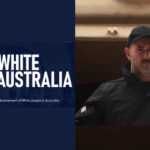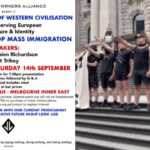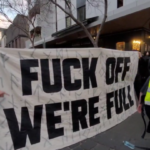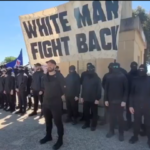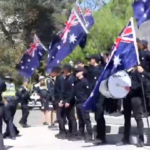The Tricky New Laws Designed to Respond to Rising Neo-Nazism in New South Wales
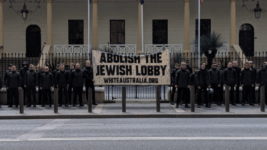
The New South Wales government has introduced laws responding to the neo-Nazi rally that took place at state parliament on 8 November 2025. These new measures are seemingly necessitated as NSW police attending the National Socialist Network (NSN) demonstration appeared powerless to stop it. Yet, many have been questioning why state law enforcement gave prior authorisation to this protest.
Introduced on 19 November 2025, the Crimes and Summary Offences Amendment Bill 2025 overhauls the August 2022-enacted offence of displaying Nazi symbols to ensure that Nazi-linked conduct is illegal, and it further performs some legislative gymnastics to allow NSW police officers to shut down displays that are potentially Nazi-related and the new indictable offences will be triable summarily.
The legislation also makes an amendment to the Form 1 process, which governs NSW police authorisation of protests in this state, in order to clarify that provision that provides protest participants with immunity to summary offences related to the obstruction of roads is not further extended to the application of hate crime laws.
NSW parliament passed the original offence of displaying Nazi symbols on 11 August 2022, which was a law that was introduced two months prior and on the same day that Victoria passed similar laws banning Nazi insignia. And this was at a point when the NSN had been sighted gathering in the Victorian Grampian wilderness in January 2021, but it was prior to its first public rally in March 2023.
Ever since the Nazis gathered before parliament and NSW Labor determined to pass laws straight afterwards, numerous constituents have raised doubts as to why on receiving a detailed Form 1 from the NSN neo-Nazis, or the White Australia Party as they’re attempting to rebrand themselves, which also stated they were to protest the “Jewish Lobby”, why no attempt was made to shut it down prior.
The proposed overhauling of the section 93ZA offence
NSW attorney general Michael Daley set out in his second reading speech on the bill that the “abhorrent conduct” on display at the NSN demonstration “highlighted the need to give police and courts greater powers to hold extremists who publicly express Nazi ideology to account”, as the sight of the 60-odd black clad Nazis bearing anti-Jewish messaging was “absolutely unacceptable”.
In terms of the offence of displaying Nazi symbols, under section 93ZA of the Crimes Act 1900 (NSW), this law is completely replaced with a new version of the crime.
New subsection 93ZA(1) contains the aggravated form of the offence, which means a person “knowingly displays a Nazi symbol, by public act and without reasonable excuse”, and it’s aggravated as it is “on or near a Jewish place”. So, if these laws are progressed, this crime will see an individual facing 2 years prison time and/or a fine of $22,000, while a corporation is subject to a $110,000 fine.
Subsection 93ZA(2) contains the regular display Nazi symbols offence, which is not on or near a Jewish place – or “a synagogue, a Jewish school or the Sydney Jewish Museum” – and it sees individuals facing up to 12 months inside and/or an $11,000, while a corporation can be fined $55,000.
In terms what a public act is defined as, it can mean communicating, any conduct or dissemination of information relating to the promotion of Nazism out in public.
The new aggravated offence of knowingly engaging in Nazi conduct by invoking imagery or characteristics in public without a reasonable excuse and on or near a Jewish place, sits under new subsection 93ZA(3), and it carries 2 years prison time and/or a fine of $22,000 for convicted individuals, while a corporation that falls foul of this law can be fined up to $110,000.
Subsection 93ZA(4) contains the regular Nazi conduct in public offence that does not occur on or near a Jewish place, and it sees individuals facing up to 12 months inside and/or a fine of $11,000, while corporations are fined $55,000.
Daley explained that the new Nazi conduct offence carries three elements to be proven by the prosecution, which include knowingly engaging in conduct in public without a reasonable excuse, as well as indicating support “for Nazi ideology by invoking imagery”, and that this would likely cause a reasonable person to “fear harassment, intimidation or violence” or fear for their safety.
Further, subsection 93ZA(8) would allow a police officer to direct a person displaying a “suspected Nazi symbol” to remove it from display, with subsection 93ZA(9) specifying that such an order can be “given orally or in writing”, it must specify the period for which the order applies, and such an order may be withdrawn in the same way it was issued.
Subsection 93ZA(10) notes that if a person fails to comply with a direction to remove a suspected Nazi symbol from display, then they can be imprisoned for 3 months and/or fined S2,200. Subsection 93ZA(11) then confirms that the NSW powers to move on civilians that are contained in part 14 of the Law Enforcement (Powers and Responsibilities) Act 2002 (NSW) have no bearing on this new law.
Subsequent amendments
The bill further inserts the overhauled 93ZA offence into table 2 part 2A clause 4F of schedule 1 of the Criminal Procedure Act 1986 (NSW). This means, if passed, the new section 93ZA offence would be considered a table 2 offence, which is a less serious indictable offence that is tried in the NSW Local Court by default.
A further amendment would list the offence in section 268 of the Criminal Procedure Act, so that the NSW Local Court is permitted to impose penalties in respect of this offence, which are higher than the usual limitations on the lower court’s ability to penalise, which are usually capped at 2 years prison time or at $11,000 for a fine.
Daley notes that as the new Nazi related offences under section 93ZA are indictable offences, or more serious crimes, this then permits NSW police officers to be able to require a person suspected of “displaying a Nazi symbol” to provide their identity – or name and address – under the power contained in section 11 of the Law Enforcement (Powers and Responsibilities) Act.
“Knowing the identity of the individual is essential for further investigation or later action if an offence is confirmed,” the AG explained in respect of cases where a person has been ordered to remove potential Nazi symbols.
The final amendment is to section 24 of the Summary Offences Act 1988 (NSW), which currently contains a law that provides immunity to participants of an authorised protest action in respect of an obstruction offence, and the proposed new subsection underscores that in these circumstances, protesters can still break the law in terms of displaying Nazi symbols or inciting hatred based on race.
Questionable authorisations
The Crimes and Summary Offences Amendment Bill 2025 has been sent to the Legislative Assembly Committee on Law and Safety to be scrutinised via the Measures to Combat Right-Wing Extremism in New South Wales inquiry, which will close for submissions on 6 February 2026, and its final report will be delivered sometime next April.
The National Socialist Network presented the NSW Police Force with a detailed 4-page 27 October 2025 Form 1 notification close to a fortnight prior to their planned demonstration.
NSW police deputy commissioner Peter Thurtell is said to have considered this document a week out from the protest taking place, and, as he did nothing about it, including neglecting to inform new NSW police commissioner Mal Lanyon, this meant the protest had been authorised.
The NSN Form 1 set out that it planned to protest 2025-enacted hate crimes and call for abolishing the Jewish Lobby, which it defined as both Zionist and anti-Zionist groups, along with pro-Jewish groups, which tends to stray into antisemitic terrain. And this demo was allowed to proceed after the state of NSW has been embroiled in an antisemitic moral panic for at least 12 months.
The question that remains is why NSW police has moved to take various protest demonstrators to court over recent years – including climate defenders, Black Lives Matter and Palestinian solidarity groups – in order to prevent their rallies, yet, when it came to a group of Nazis clearly promoting white supremacy and targeting Jewish constituents, the force simply authorised this to go ahead.



